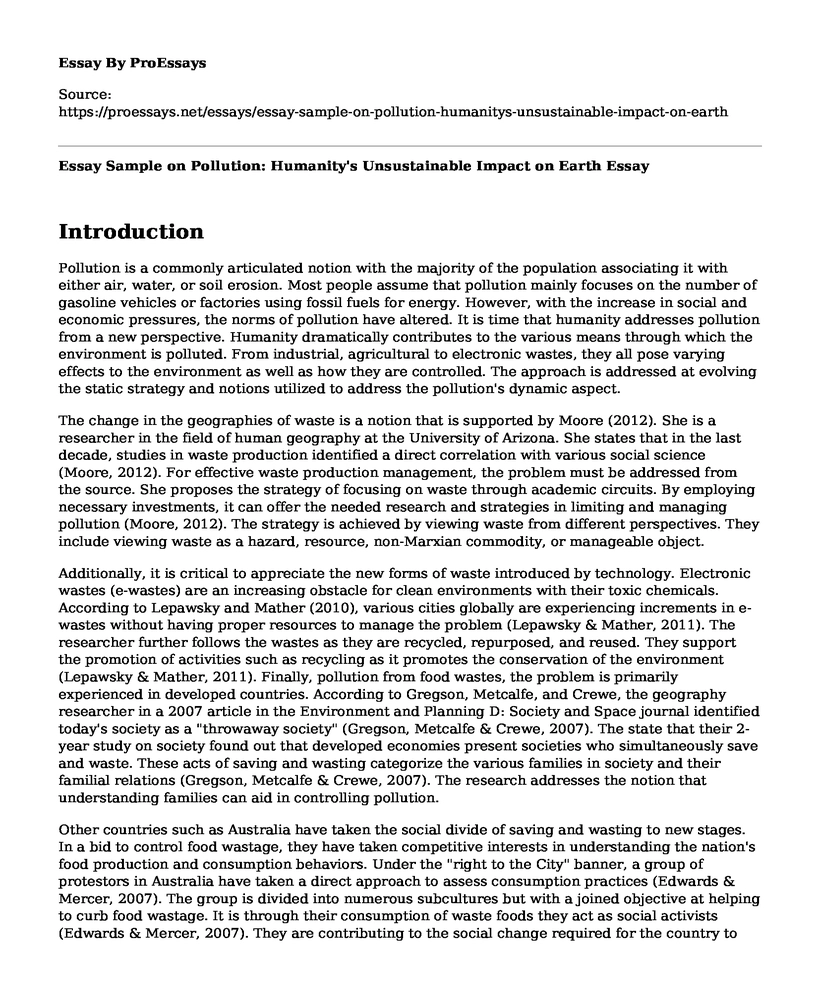Introduction
Pollution is a commonly articulated notion with the majority of the population associating it with either air, water, or soil erosion. Most people assume that pollution mainly focuses on the number of gasoline vehicles or factories using fossil fuels for energy. However, with the increase in social and economic pressures, the norms of pollution have altered. It is time that humanity addresses pollution from a new perspective. Humanity dramatically contributes to the various means through which the environment is polluted. From industrial, agricultural to electronic wastes, they all pose varying effects to the environment as well as how they are controlled. The approach is addressed at evolving the static strategy and notions utilized to address the pollution's dynamic aspect.
The change in the geographies of waste is a notion that is supported by Moore (2012). She is a researcher in the field of human geography at the University of Arizona. She states that in the last decade, studies in waste production identified a direct correlation with various social science (Moore, 2012). For effective waste production management, the problem must be addressed from the source. She proposes the strategy of focusing on waste through academic circuits. By employing necessary investments, it can offer the needed research and strategies in limiting and managing pollution (Moore, 2012). The strategy is achieved by viewing waste from different perspectives. They include viewing waste as a hazard, resource, non-Marxian commodity, or manageable object.
Additionally, it is critical to appreciate the new forms of waste introduced by technology. Electronic wastes (e-wastes) are an increasing obstacle for clean environments with their toxic chemicals. According to Lepawsky and Mather (2010), various cities globally are experiencing increments in e-wastes without having proper resources to manage the problem (Lepawsky & Mather, 2011). The researcher further follows the wastes as they are recycled, repurposed, and reused. They support the promotion of activities such as recycling as it promotes the conservation of the environment (Lepawsky & Mather, 2011). Finally, pollution from food wastes, the problem is primarily experienced in developed countries. According to Gregson, Metcalfe, and Crewe, the geography researcher in a 2007 article in the Environment and Planning D: Society and Space journal identified today's society as a "throwaway society" (Gregson, Metcalfe & Crewe, 2007). The state that their 2-year study on society found out that developed economies present societies who simultaneously save and waste. These acts of saving and wasting categorize the various families in society and their familial relations (Gregson, Metcalfe & Crewe, 2007). The research addresses the notion that understanding families can aid in controlling pollution.
Other countries such as Australia have taken the social divide of saving and wasting to new stages. In a bid to control food wastage, they have taken competitive interests in understanding the nation's food production and consumption behaviors. Under the "right to the City" banner, a group of protestors in Australia have taken a direct approach to assess consumption practices (Edwards & Mercer, 2007). The group is divided into numerous subcultures but with a joined objective at helping to curb food wastage. It is through their consumption of waste foods they act as social activists (Edwards & Mercer, 2007). They are contributing to the social change required for the country to experience both social and environmental integrity.
Conclusion
Society should embrace the fact that social and technological pressures have changed the norms of pollution. Now humanity must consider other factors such as food and electronic waste as they try to contain the already worrying air and water pollution caused by industries.
References
Edwards, F., & Mercer, D. (2007). Gleaning from Gluttony: an Australian youth subculture confronts the ethics of waste. Australian Geographer, 38(3), 279-296. doi: 10.1080/00049180701639174
Gregson, N., Metcalfe, A., & Crewe, L. (2007). Identity, Mobility, and the Throwaway Society. Environment And Planning D: Society And Space, 25(4), 682-700. doi: 10.1068/d418t
Lepawsky, J., & Mather, C. (2011). From beginnings and endings to boundaries and edges: rethinking circulation and exchange through electronic waste. Area, 43(3), 242-249. doi: 10.1111/j.1475-4762.2011.01018.
Moore, S. (2012). Garbage matters. Progress In Human Geography, 36(6), 780-799. doi: 10.1177/0309132512437077
Cite this page
Essay Sample on Pollution: Humanity's Unsustainable Impact on Earth. (2023, May 09). Retrieved from https://proessays.net/essays/essay-sample-on-pollution-humanitys-unsustainable-impact-on-earth
If you are the original author of this essay and no longer wish to have it published on the ProEssays website, please click below to request its removal:
- Essay Example on Interconnectedness
- Global Warming Experiment Paper Example
- Case Study on MHE509 SLP 3
- Research Paper on Benefits of Green Strategy in the US Market
- Research Paper on Climate Change: Greatest Threat to Humanity?
- The Impact of Plastic Straws on Our Environment - Essay Sample
- Essay Sample on Atmospheric Air Pollution: Global Hazard, Respiratory Illness, Mortality







